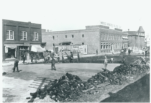Can’t change or defend truth about res. schools
By Letter to the Editor on February 9, 2018.
Re: “So sorry, but I am not sorry,” Jan. 22 Paul McLennan’s recent column is a sad litany of bleak, cold, disaffected and self-satisfiedly ignorant statements about social justice issues in Canada. None of his statements seem to have had the benefit of any thought or ideas reaching beyond the 1950s, particularly his statements regarding residential schools. He seemed to be bothered that our prime minister apologized “… to our native communities for past missteps in our efforts to educate and integrate our Indigenous communities through residential schools.” He further stated he is not sorry for any of this, and then equated the prime minister’s apology to grovelling. Firstly, an apology for wrongs done to others is not grovelling, except in the jaded minds of the perpetually ticked off. The apology was merely the beginning of doing the decent thing on this issue. Secondly, it is useful to appraise our “missteps,” as he calls them, in light of history. In Canada, residential schools began about 1840. About a hundred years later, there were 80 of these schools. They were official federal government policy, carried out national by the Catholic Church and the Anglican church and, to a lesser extent, by the Presbyterian and Methodist churches. At these schools, children were forbidden to speak their own languages and forbidden to follow their cultural practices. They were beaten if they tried to do so. Contact between children and parents was discouraged, even prevented. Schools were overcrowded and disease was rampant, as was sexual and physical abuse of the children. Children in Canada’s residential schools died in large numbers. Their parents sometimes did not even receive the courtesy of being told that their child had died. The survivors — and they were literally survivors — often left residential schools mentally scarred and dysfunctional in social and familial ways. But according to Mr. McLennan, all of this was simply “missteps in our efforts to educate and integrate.” Would Mr. McLennan sign up his own children or grandchildren for such schools? Thirdly, let us look at the background of the peoples upon whom the residential school horror show was inflicted. Here, again, history is helpful in appraising Mr. McLennan’s statements. Up to 500 years ago, before sustained and regular European contact with native peoples in North America, there were more than 500 distinct tribes and more than 300 languages. There is not now and never has been such numbers and diversity in Europe for comparison. Indigenous peoples had social systems, political alliances, trade relationships and religions all developed, functioning and long in place before anything similar in Europe, Egypt or China. In spite of all this, Mr. McLennan — and others — have the crass effrontery to say that Indigenous peoples needed us to educate them and that our barbarous efforts to do so were merely “missteps.” Many of the problems Indigenous peoples wrestle with today flow directly from residential schools forced upon them. The wilfully blind protestations from those who have a phobia about “political correctness” can neither defend, nor change that truth. (For more on this, please see The Inconvenient Indian by Thomas King, published 2012; The Atlas of Indian Nations by Anton Treuer, published 2013; and Canada’s Stonehenge, by Gordon R. Freeman, published 2009.) Gregory R. Cote Irvine, Alta. 12-11





